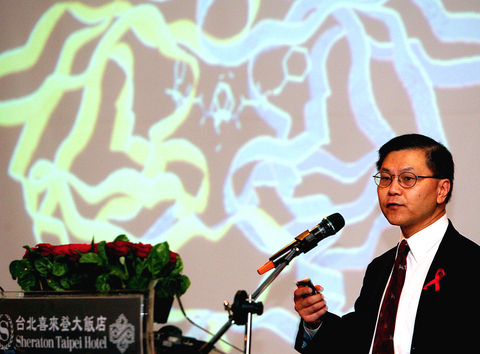Staff Reporter
The country needs to embrace the burgeoning field of bio technology in the way it embraced information technology, said David Ho(
Speaking at a celebration of 10 years of Highly Active Anti-Retroviral Therapy (HAART) use in Taiwan, Ho told the audience that Taiwan has what it takes to be an "innovation-based society" but needs to focus on encouraging development and stemming brain-drain.

PHOTO: WANG YI-SUNG, TAIPEI TIMES
Taiwan introduced HAART or "cocktail" treatment in 1997 after hard lobbying by then Department of Health head Chang Po-ya (
Before the new treatment arrived, being diagnosed as HIV positive was considered a death sentence, said Wu Shiow-ing (
"We used to hear about patients killing themselves after learning that they had HIV," Wu said. "Such incidents are much rarer since cocktail treatment was introduced because people now have hope."
Some of the patients who received the first batch of pills that department employees worked overtime to divvy up and send to hospitals are still alive, she added.
Ho, a Taiwanese-American, was chosen as Time magazine's man of the year in 1996. He now conducts research in the US and Taiwan.
"Taiwan must do more to develop industries of the future," Ho said. "So far, Taiwan has done a fabulous job developing its IT sector, but so far it seems to have missed out on biotech."
"There is no doubt in my mind that Taiwan has the capability to do the kind of clinical trials [required for further research into HIV]," said Ho, citing Taiwan's "remarkable" work with hepatitis B in support of his statement.
Ho is currently working on vaccines for HIV and several influenza viruses.
"We have entered stage two trials for our HIV vaccines," he said. "Tests show that with three doses of the vaccine, 90 percent of participants display a response."
However, whether or not the immune system response means that the participants have developed protection against HIV is still unknown, said Ho.
"The vaccine will not be ready in the near future," said Ho.
Ho said that Taiwan's isolation from the international health community makes internal biomedical development even more important.
"Of course, it is very harmful that Taiwan is not a part of the WHO," he said. "We are denied access to a lot of information. We have to make up for that by being more independent."
"Ultimately, however, the WHO does not hold the solution to the problems of the world," Ho said. "That is up to research done in individual countries."
The non-profit Taiwan AIDS Foundation, however, yesterday criticized the government, claiming that the number of people contracting AIDS in Taiwan has not decreased despite use of Ho's therapy treatment.
Foundation Chairman Twu Shiing-jer (涂醒哲), a former minister of health, said at a separate news conference that the foundation had found that the government was implementing a "biased" anti-AIDS policy -- concentrating most resources in medical treatment and checks.
Twu blamed the situation on the fact that some people wrongly believed that the cocktail therapy can cure the disease after it proved successful in prolonging the lives of AIDS patients.
Shi said the therapy allows AIDS patients to lead a normal life by reducing the HIV virus load in their bodies. However, with more and more AIDS patients needing the treatment, the department has been forced to spend more money on providing the cocktail and conducting medical examinations.
Additional reporting by CNA

Taiwanese can file complaints with the Tourism Administration to report travel agencies if their activities caused termination of a person’s citizenship, Mainland Affairs Council Minister Chiu Chui-cheng (邱垂正) said yesterday, after a podcaster highlighted a case in which a person’s citizenship was canceled for receiving a single-use Chinese passport to enter Russia. The council is aware of incidents in which people who signed up through Chinese travel agencies for tours of Russia were told they could obtain Russian visas and fast-track border clearance, Chiu told reporters on the sidelines of an event in Taipei. However, the travel agencies actually applied

Japanese footwear brand Onitsuka Tiger today issued a public apology and said it has suspended an employee amid allegations that the staff member discriminated against a Vietnamese customer at its Taipei 101 store. Posting on the social media platform Threads yesterday, a user said that an employee at the store said that “those shoes are very expensive” when her friend, who is a migrant worker from Vietnam, asked for assistance. The employee then ignored her until she asked again, to which she replied: "We don't have a size 37." The post had amassed nearly 26,000 likes and 916 comments as of this

New measures aimed at making Taiwan more attractive to foreign professionals came into effect this month, the National Development Council said yesterday. Among the changes, international students at Taiwanese universities would be able to work in Taiwan without a work permit in the two years after they graduate, explainer materials provided by the council said. In addition, foreign nationals who graduated from one of the world’s top 200 universities within the past five years can also apply for a two-year open work permit. Previously, those graduates would have needed to apply for a work permit using point-based criteria or have a Taiwanese company

The Shilin District Prosecutors’ Office yesterday indicted two Taiwanese and issued a wanted notice for Pete Liu (劉作虎), founder of Shenzhen-based smartphone manufacturer OnePlus Technology Co (萬普拉斯科技), for allegedly contravening the Act Governing Relations Between the People of the Taiwan Area and the Mainland Area (臺灣地區與大陸地區人民關係條例) by poaching 70 engineers in Taiwan. Liu allegedly traveled to Taiwan at the end of 2014 and met with a Taiwanese man surnamed Lin (林) to discuss establishing a mobile software research and development (R&D) team in Taiwan, prosecutors said. Without approval from the government, Lin, following Liu’s instructions, recruited more than 70 software